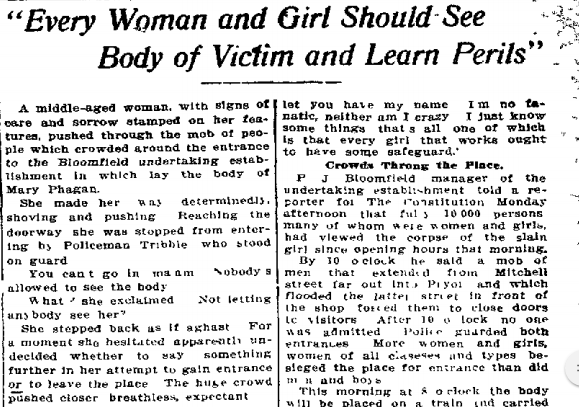Another in our series of new transcriptions of contemporary articles on the Leo Frank case.
Atlanta Constitution
Tuesday, April 29th, 1913
A middle-aged woman, with signs of care and sorrow stamped on her features, pushed through the mob of people which crowded around the entrance to the Bloomfield undertaking establishment in which lay the body of Mary Phagan.
She made her way determinedly, shoving and pushing. Reaching the doorway she was stopped from entering by Policeman Tribble who stood on guard.
“You can’t go in, ma’am. Nobody’s allowed to see the body.”
“What?” she exclaimed. “Not letting anybody see her?”
She stepped back as if aghast. For a moment she hesitated, apparently undecided whether to say something further in her attempt to gain entrance or to leave the place. The huge crowd pushed closer, breathless, expectant.
“Listen,” she burst out, “Every woman in Atlanta, every working girl, every school girl ought to see that little girl in there. They ought to take a good look at her. They ought to see what perils and what dangers they have to face.”
“An Education to Women and Girls.”
She hesitated slightly as though waiting for her words to take effect. Without moving her eyes from those of the policeman she resumed.
There are plenty of men in Atlanta and in every other city who are degenerate enough to commit just such murders as that. All women and girls ought to see and be able to realize their danger. You are making a big mistake by not letting anybody in. Everybody ought to be allowed entrance. It’s [2 words illegible] to the women and girls. It will open their eyes to peril.”
Not a sound was made from the crowd except the noise of shuffling feet as they edged closer. The little woman stopped, gazed ruefully into the interior of the undertaking shop, then moved on up Pryor street toward Mitchell, refusing to give her name.
“No! You can’t get my name. You can publish that sermon I gave just now,” she exclaimed, “but I won’t let you have my name. I’m not fanatic, neither am I crazy. I just know some things that’s all, one of which is that every girl that works ought to have some safeguard.”
Crowds Throng the Place.
P. J. Bloomfield, manager of the undertaking establishment told a reporter for The Constitution Monday afternoon that fully 10,000 persons, many of whom were women and girls, had viewed the corpse of the slain girl since opening hours that morning.
By 10 o’clock, he said, a mob of men that extended from Mitchell street far out into Pryor, and which flooded the latter street in front of the shop forced them to close doors to visitors. After 10 o’clock no one was admitted. Police guarded both entrances. More women and girls, women of all classes and types besieged the place for entrance than did men and boys.
This morning at 8 o’clock, the body will be placed on a train and carried to Marietta. The funeral services will be held in the cemetery there at 10 o’clock and the interment will be in that place. A party of friends will accompany the family and attend the services.
Coroner Donehoo gave permission Monday night for the body’s removal before the inquest which will be held this morning at 10 o’clock.
* * *
Atlanta Constitution, April 29th 1913, “Every Woman and Girl Should See Body of Victim and Learn Perils,” Leo Frank case newspaper article series (Original PDF)

